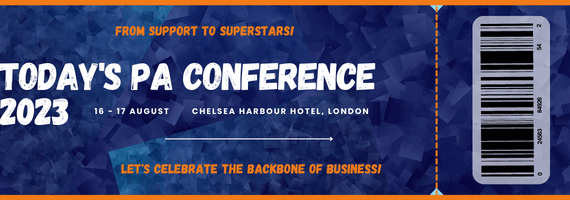Shopping cart
Your cart is empty
£0.00

When Caroline Wylie started her VA business, Virtually Sorted, both the industry and the internet were still relatively new. Since then, technology has moved on, as has the idea of virtual working, with more and more businesses embracing the idea. But despite the advantages on both sides, things can easily go wrong.
As a specialist in creating and managing virtual teams, Caroline understands the professional and social needs of remote workers, and knows that, to be effective, employers and employees must cultivate their soft skills – and develop a new way of thinking.
We spoke to Caroline ahead of her talk at the Today’s PA Conference and discussed the challenges of working from home, the boss/PA relationship, and why all PAs (virtual or office-based) must set their own boundaries.
“People do understand it better these days but we still get asked what we do and how. It’s been years and we still get asked! Having said that, I think the definition and scope of what VAs can do has changed enormously. It’s evolved as the technology has evolved, which has been fascinating.
As to what prompted me to be become a VA, it’s very simple – I wanted to wear jeans to the office! Well, that’s the short answer. But the slightly longer answer is because I wanted more control over my working day. I wanted more control over who I was working with, when and where. You hear that a lot from VAs. I also wanted to have control over the types of jobs I took on. When you specialise in a certain industry, you speak their language. Although I must admit, I don’t really specialise now because one thing I enjoy about being a VA is working with a variety of clients. And I’m naturally nosey – a very underrated quality! – so I like finding out about other industries. It keeps it fresh for me. I also love juggling my workload, and the fact that I never know what I’m going to be doing next.
Before I was a VA, I was a serial ‘job hopper’. I jumped between advertising, music, travel, and the media. Those were the industries I was interested in. I would be in a role for about 18 months, get a bit bored, and then go and do something else!
As well as wanting to be more in control, you’ll hear VAs talking about having more flexibility in their working lives. That may be the flexibility to look after children or older relatives, the flexibility not to have to sit in the car for two hours every day in rush hour, or the chance to find a more settled work/life balance. Which is what we all want.”
“No, I haven’t really. You just have to look at the USA, which is around 10 – 15 years ahead of where the UK VA industry is at any given point. Yes, we have a fast-growing industry, but they have thousands and thousands of VAs, tens of thousands, all working remotely. Their technology has always been that bit ahead of ours but now it’s catching up and our VA industry is getting stronger and stronger.
One thing I would say is that every time that we have a downturn in the economy, you will see a corresponding spike in the number of VAs joining the industry – perhaps having been made redundant or taking the opportunity to become self-employed. We also see a spike in clients using VAs – maybe because firms are downsizing or looking to reduce admin costs. It’s a double whammy as it seems almost recession-proof as an industry.”
“I work with a team of about 15 – 20 VAs, all of whom have a range of specialist skills and expertise. Initially, I had several employees but very quickly it became obvious that wasn’t going to work for my business model. I found that clients would send in their work either first thing in the morning or last thing in the evening, say, from 4pm onwards. But the employees finished work at 5pm. So I was usually still typing away at midnight because the deadline was the following day and I couldn’t wait for the team to arrive the next morning.
We decided to take on a number of typists who worked in the evening on a freelance basis, and also several self-employed assistants who worked remotely. This gave us a wider pool of skills and experience and meant we could produce higher quality work with a much more rapid turnaround. It also meant we could be flexible about how the VAs worked. We weren’t expecting anybody to turn up 35 hours a week and sit in our office. They were able to work around their commitments, take whatever time they needed, and as long as the work was done, it didn’t matter whether it was at 8pm or 5am.”
“Yahoo were one of the first major companies to do this. IBM, too, have just cancelled many of their remote working contracts.
In Yahoo’s case, they said that one of the main motivators was that staff working from home were not as effective or as creative as those working in the office. They needed employees to be able to collaborate, be available for quick brainstorming sessions, and spark ideas off each other. This is a little unfair because I think Yahoo’s figures included people who would only occasionally work from home, not day-to-day as part of their normal working routine.
When I say I work from home, one question I always get asked is how do I manage to ignore the washing, the ironing, etc? The answer to that is very easily! If I don’t work, I don’t get paid. I have an office, and when I close that door, that’s it, that’s me at work.
There are formal remote working arrangements … and then there are the informal ones, perhaps where someone needs to work from home one day a week because of childcare considerations or waiting in deliveries, things like that. In these cases, because it’s an unusual arrangement, not part of their routine, they may not have the same systems set up, the same technology available. That is why they’re not as effective as when they’re in the office. This shouldn’t be a surprise, because for them, it isn’t a standard working arrangement.
There is also the risk that some staff members could take advantage of ‘working from home’! But perhaps the real problem here – apart from the lack of routine – is with the companies themselves. Most businesses are used to their staff being based in the office and managing their employees face-to-face. They haven’t developed the techniques to make sure remote workers are being as effective as possible in their roles. There is no monitoring or assistance in place to check whether the work is being done. So, suddenly, it becomes a major issue when HR need to speak to you but can’t get hold of you because they don’t realise that your working hours are 10am to 2pm to allow you to do the school run.
Another issue – and one that I will be discussing at the conference – is the risk of remote workers becoming isolated from their colleagues and retreating into their own little world. Managing remote staff in exactly the same way as office-based staff causes problems. Smaller companies, maybe ones who have been using VAs for some time, have had to develop a different way of looking after their remote workforce, and managing them more effectively. They have the flexibility and can adapt to situations more quickly.
Unfortunately, some organisations don’t tell people about their remote employees. When I started as a VA, I would ask a client for a testimonial and they were not always totally confident with that idea, saying, ‘well, we don’t really want people knowing that you’re not one of us!’ It’s less of a problem now because people understand that it’s a way of reducing overheads and managing workloads. That’s something smaller companies have always had to do; look at the bottom line and try to work out the most efficient way of working.”
“All PAs will have worked virtually with their boss at some point, because of travel, working abroad, or working from home. It isn’t anything new but the difference now is that many roles are designed to work completely remotely. Previously, you probably had a face-to-face catch up with your boss quite frequently, even if they were working virtually most of the time. Nowadays, there are PAs who never see their bosses!
I read recently that about 50% of people already work remotely one day a week, and there is only about 30% of people who never work remotely. So that means there may be another 20% who work remotely only occasionally, maybe less than once a week. It’s a massive trend.
When PAs choose to work from home, managers need to understand it’s because they have other things going on in their lives. It isn’t fair to expect a PA to be working whenever their boss is working. PAs also have commitments outside of work.
But at the same time, PAs need to be very clear on where that line is drawn, when you are at work and when you are not. In France, there is a new law that states managers are not allowed to email employees outside of their working hours as it’s deemed too stressful. Even if the manager doesn’t intend for the employee to respond until the following morning, the law says that employers should not contact their staff outside working hours.
That’s an interesting way of dealing with the problem, but as a remote PA – or even as an office-based PA – you have to make that distinction and make sure it’s understood. If your job finishes at 5pm, then you should not be taking work calls after 5pm or 6pm at the latest. You have to set those boundaries – and make certain you don’t answer that call or respond to that text at 7pm or 9pm. And it is up to the PA to make sure those boundaries are clear to their manager or managers.
All bosses are different but in my experience, I don’t think managers expect PAs to respond to emails or texts at 11pm or midnight. Most of the time they just want to send the email then, while they’re thinking about it, but they don’t expect a response straight away!”
“I’m a bit old school about this. We have a rule in the office that all work comes in via email. All my clients know that if they want a job done, it has to be sent by email. It means everything comes to one central point so we can minimise the risk of any work being missed.
But we’re all aware of how easy it is to misread the tone of emails or texts! Maybe your boss or a client sends you a quick email – very quick, because they’re on the train and nearly at their stop. When you read it, you wonder why it sounds so terse. Actually, we have that a lot with one particular client. He sends emails on his phone, just really quickly – just one-word emails. However, we know he isn’t being grumpy, we know he’s just busy, and so no one takes offence! That’s the kind of thing you have to take into account. It’s important to think about how you’re communicating with people. If it’s via text or email, make it clear. Without the tone of voice or body language, it doesn’t always translate the way it’s intended.”
“There are so many! Tech skills are obviously important. I will be discussing those at the Conference, because there are some really cool things out there. But soft skills are so important. When it comes to working remotely, you rely on soft skills around 90% of the time.
My absolute top tip would be learn how to create those water cooler moments. Those interactions that would happen spontaneously in an office but, when you work remotely, you need to recreate. That is the soft skill that’s missing from many big companies because there is this tendency to try to manage remote workers in a very traditional way.
If both you and your boss are working remotely, you need to make sure you catch up. Not just to discuss work and priorities but to talk about life in general. Think about how you would chat to someone in the office. “Hello, how are things going?”, “How busy has it been today?”, “You sound really tired, are you ok?” These conversations happen naturally in an office environment. Remote or virtual employees can feel cut off from their colleagues so it becomes even more important to create these social interactions. That’s the key to a happy, healthy remote workforce.”
__________________________________________________________
Caroline will be speaking at the Today’s PA Conference on Friday 16th August 2019 at the Chelsea Harbour Hotel, London SW10, as well joining in our Expert PA Panel discussion on “What Do Leaders Look for in their PAs”?



Tel.: +44 (0)20 7622 2400
Email: info@todayspa.co.uk
Today's PA
52 The Warwick Building
Chelsea Bridge Wharf
366 Queenstown Road
London
SW11 8NJ
Copyright © 2024 Today's PA. All rights Reserved.
We use cookies, just to track visits to our website, we store no personal details.
ACCEPT COOKIES What are cookies?